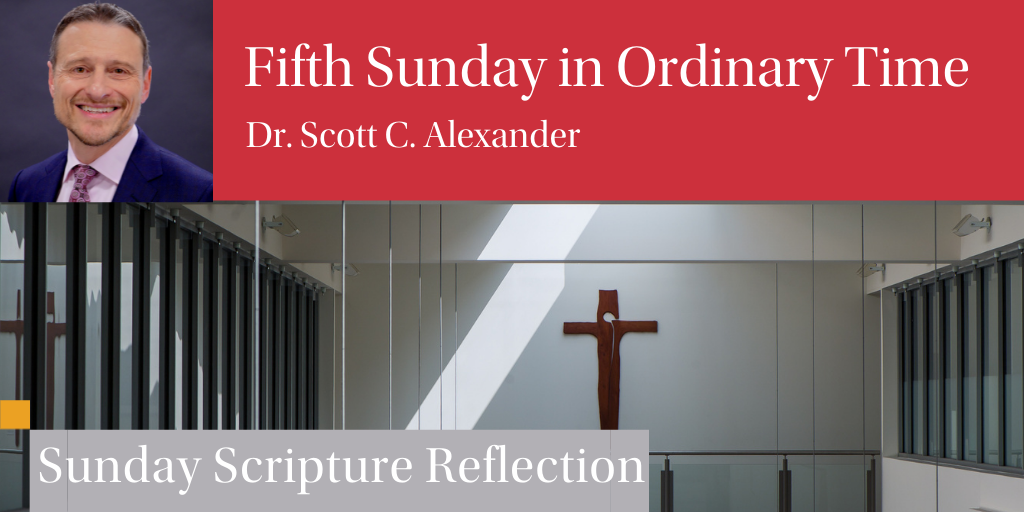

Readings:
Reading I: Isaiah 6:1-2a, 3-8
Psalm: 138:1-2, 2-3, 4-5, 7-8
Reading II: 1 Corinthians 15:1-11
Gospel: Luke 5:1-11
One of the many struggles for equilibrium in the life of faith is the one that exists between the importance of being reasonable, and the willingness to venture beyond the bounds of what our various cultural and ecclesial contexts deem “reasonable.” It’s a struggle alluded to in the Church’s teaching on the special role accorded the first of the four “cardinal” human virtues—namely, prudence—and specifically how it relates to the third, which is fortitude.
Drawing on Aquinas’s adaptation (Summa II-II, q. 47) of Aristotle’s teaching on phronēsis (Greek, “prudence” or “practical wisdom”), the Catechism of the Catholic Church affirms the preeminent status of prudence as the ‘guide’ or “charioteer of the virtues” (Latin, auriga virtutum). It is the role of prudence to ensure “right reason in action,” by seeing to it that the other virtues (i.e., justice, fortitude, and temperance) are exercised in a “sane” and “sober” manner. The Catechism is clear that prudence should govern the other virtues. It also warns, however, that in this governing capacity, prudence ought not be “confused with timidity or fear, nor with duplicity or dissimulation” (1806).
This warning points to special tension in the relationship between prudence and fortitude. If fear often disguises itself as prudence, and fortitude is the virtue that “enables one to conquer fear, even fear of death,” to the point of being willing “to renounce and sacrifice [one’s] life in defense of a just cause” (1808), then questions arise as to whether—in relation to fortitude—prudence should always be, as Aristotle and Aquinas counsel, in the “chariot’s” driver’s seat.
In this Sunday’s Gospel from Luke, it appears that the Evangelist might take issue with this sage advice. As Luke Timothy Johnson points out, the much lengthier Lukan account of the disciples’ call by the Lake of Gennesaret (5:1-11) stands in rather bold relief when juxtaposed to its parallels in Mark (1:16-20) and Matthew (4:18-22). The comparatively brief narratives of the Markan and Matthean accounts involve little more than an uncomplicated, immediate, and affirmative response on the part of Simon, Andrew, James and John to the call of Jesus to follow him and become “netters of people” (L. T. Johnson, The Gospel of Luke, 1991). Instead of echoing this simple tale of simple laborers accepting the invitation of an equally simple albeit charismatic rabbi, Luke deliberately dramatizes this watershed event in the lives of our Galilean “netters of fish” as precisely one of those moments where prudence and fortitude appear to be at odds. Only, in this case—much to any conventional Aristotelian’s dismay—fortitude seems to govern prudence, and not vice versa.
Let’s start with the fortitude—some might even say “presumptuousness”—of Jesus himself. Seemingly devoid of any concern with the potential consequences, Jesus rather imprudently commandeers the boat of an unsuspecting fisherman who, after a long and fruitless day of backbreaking work, appears pressured into ferrying the bold preacher “a short distance from the shore,” so that the latter can, in contemporary parlance, “practice social distancing” in the face of a burgeoning and encroaching audience.
At this point, I like to imagine Simon Peter anticipating telling his wife, when he got home that evening: “You’ll never believe what happened to me today. After hours of casting our nets and coming up empty every time, the guys and I we were exhausted and washing our nets. Suddenly this self-absorbed Nazarene preacher, worried that he won’t be heard if the crowd he’s drawn gets too close, just steps right into my boat and expects me to take him out a stone’s throw so that he can avoid being overrun by his own adoring fans!”
As it turns out, Peter will never end up telling his wife this story—at least not in this way. This is not because Jesus ends up behaving more prudently and less presumptuously, but because Peter himself appears willing to play the sucker and do what the preacher asks of him rather than do the prudent thing and plainly tell Jesus either to get out of his boat, or at least offer to pay a modest rental fee.
One can only assume that, as Peter sat listening to this presumptuous preacher who commandeered his boat, he too was becoming a fan of the Nazarene. Something Jesus said must have inspired him to accede to the wildly unreasonable command of the man he decides refers to as “Master” (Gk. epistatēs). In spite of his practical wisdom telling him it’s a waste of his time, energy, and other personal and professional resources, Peter nonetheless “put[s] out into deep water” so that he might once again cast his nets in what prudence warns is almost certain to be a fool’s errand.
In this story, however, not only is prudence trumped by fortitude; it is also rendered nearly irrelevant by astonishment. The subsequent “miraculous catch of fish” upends all prudent expectations in such dramatic and intense a fashion that the miracle introduces dangers even beyond the ones prudence predicted. The catch is so abundant—the miracle so pregnant with possibility—that, like a difficult childbirth, it threatens the very livelihood of Simon Peter and his business “partners” as it tears their nets and nearly sinks their boats.
With his prudence temporarily stunned into submission by astonishment, Peter goes so far as to repent—not for having denied either of Jesus’s two requests, each of which he granted—but for the ‘sin’ of raising reasonable and prudent objections to Jesus’s second request when all the while he was in the presence of a prophet who wielded the awesome power of the God of Israel. In addition to repenting for exercising good judgment and voicing his reservations, the astonished Peter and his equally astonished associates engage in an act of utterly unbridled fortitude. Luke tells us that, despite the many other prudential reservations they may have had about the life-altering decision they were each about to make, “they left everything” and accepted Jesus’s commission to become “netters of people.”
Luke’s version of the disciples’ call and the miraculous catch of fish is, on some level, a cautionary tale of the promises of discipleship that may never be realized if we are to follow Aristotle and Aquinas and attempt to cede permanent, uninterrupted status to prudence as the “charioteer of virtues.” It is not, however, a denial of the critically important role of practical wisdom in the life of faith.
Despite Peter’s misplaced sense of guilt for having offered objections to Jesus’s command to “put out into deep water,” at no point do we see Jesus even hinting that these objections are unreasonable, or even that they offend him in the least. Neither does Jesus promise that, by becoming “netters of men,” Peter and the sons of Zebedee would be embarking on a ministry replete with miracles—a new vocation which would permanently deliver them from the quotidian hardships of their lives as Galilean “netters of fish.” Far from it. The torn nets and boats on the verge of sinking foreshadow the even greater hardships and dangers of Christian discipleship—hardships and dangers that will certainly require the exercise of a considerable degree of prudence, especially when there seems to be a scarcity of miracles.
It is no coincidence that, in the First Reading, the Church presents us with a narrative from the 8th-century BCE text of Proto-Isaiah 6 which embodies an antecedent version of what we might refer to as the “commissioning-in-astonishment” trope found Luke 5. Like Peter, the prophet is overwhelmed by an astonishing vision of the divine throne—one which evokes a profound sense of dread and an almost simultaneous act of repentance. And like Peter, Isaiah humbly, yet boldly, accepts his commission: “Here am I; send me!”
Like Isaiah and Simon Peter, God beckons each of us to be astonished by the admittedly less sensational, but every bit miraculous nature of our own commissioning—for many of us the commissioning of our baptism. God urges us to allow our own astonishment at Her presence in our lives to be a source of fortitude for ministries which value prudence without idolizing it.
My CTU colleague and friend, Dr. Christina Zaker, argues in her marvelous new book that spiritual reflection through parables requires a willingness to be, as the title suggests, “surprised by God.” In this same book, Zaker goes further and, in her epilogue on “Finding Hope in Family during COVID-19,” invites us to ask ourselves, whether even, or perhaps especially, in times of great adversity, we are open to being “surprised” or astonished by God. In doing so she raises important questions about the centrality of the capacity for astonishment in the life of faith, and about the role this capacity plays in giving us the courage necessary—even in the face of genuinely prudent objections—to say “yes” to whatever God may be asking of us.